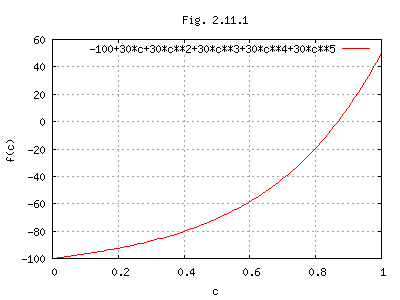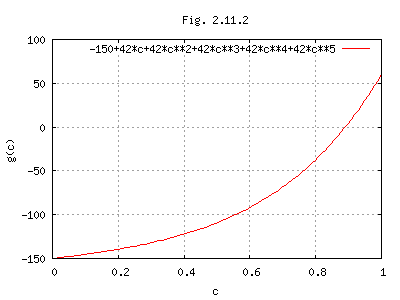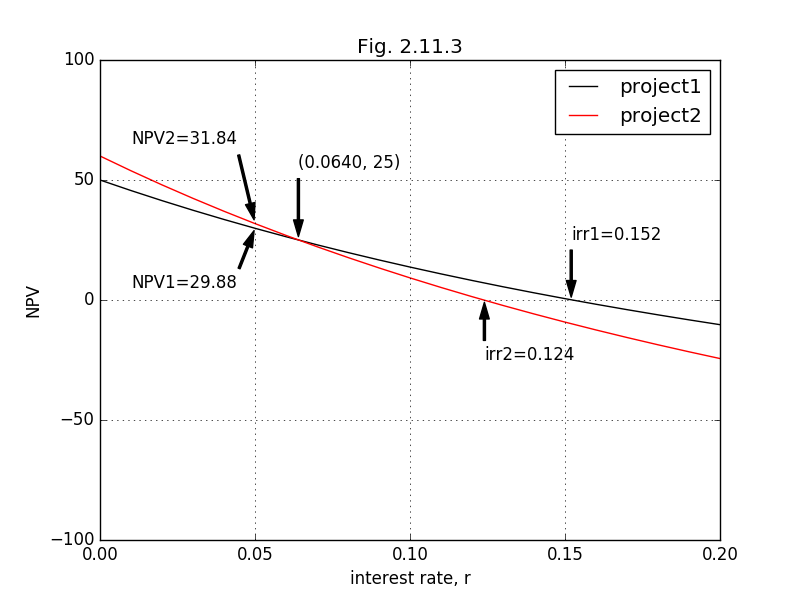2.11 Conflicting recommendations
(条件)r = 0.05
プロジェクト1とプロジェクト2の正味現在価値をそれぞれNPV1、
NPV2とすると、それぞれは次となる。
NPV1 = -100 + 30 / (1 + r) + ... + 30 / (1 + r)5
= -100 + (30 / r)(1 - 1 / (1 + r)5)
= 29.88
NPV2 = -150 + 42 / (1 + r) + ... + 42 / (1 + r)5
= -150 + (42 / r)(1 - 1 / (1 + r)5)
= 31.48= 31.84
∴正味現在価値基準からは、プロジェクト2が推奨案となる。
プロジェクト1の内部収益率IRR1は、 次式を満たすcをIRR=(1/c)-1の関係に代入して得る。
f(c)=-100 + 30c + 30c2 + 30c3 + 30c4 + 30c5 = 0
f(c)の図をFig.2.11.1に示す。

試行錯誤により、c = 0.868
IRR1 = (1 / c) - 1 = 0.152 = 15.2(%)
プロジェクト1の内部収益率IRR2は同様に、
g(c) = -150 + 42c + 42c2 + 42c3 + 42c4 + 42c5 = 0
g(c)の図をFig. 2.11.2に示す。

試行錯誤により、
c =
0.891
0.890
IRR2
= (1 / c) - 1
= 0.122
0.124
= 12.2
12.4 (%)
∴内部収益率基準からは、プロジェクト1が推奨案となる。
(私は内部収益率と正味現在価値では異なる推奨案が求まる理由を説明できない。)
上に示す通り、内部収益率と正味現在価値では異なる推奨案が求まった。 その理由を次に示す。(added on 2016-12-04.)
内部収益率はキャッシュフロー流列で定まるが、 キャッシュフロー流列の正味現在価値はキャッシュフロー流列と金利で定まるため、 推奨案が異なる場合がある。
下図で言うと、NPVが等しくなる金利を超える場合(r > 0.0640)プロジェクト1がNPV基準 と内部収益率基準で推奨案となるが、NPVが等しくなる金利未満(r < 0.0640)では、 NPV基準ではプロジェクト2が推奨案になり、内部収益率基準ではプロジェクト1 が推奨案になる。
下図の説明
プロジェクト1とプロジェクト2の金利とNPVの関係をFig. 2.11.3 に示す。
irr1、irr2は、プロジェクト1とプロジェクト2の内部収益率を表す。
(0.0640, 25)は、プロジェクト1のNPVとプロジェクト2のNPVが等しくなる金利
(r = 0.0640)とそのNPV(= 25)を表す。

上の図を書くcode を次に示す。
# 2.11.plot.py # create on 2016/12/04 import numpy import matplotlib.pyplot as plt # input step = 0.01 rate = numpy.arange(0, 1, step) cfs1 = numpy.array([-100, 30, 30, 30, 30, 30]) cfs2 = numpy.array([-150, 42, 42, 42, 42, 42]) # calculate npv1 = numpy.array([numpy.npv(x, cfs1) for x in rate]) npv2 = numpy.array([numpy.npv(x, cfs2) for x in rate]) # output plt.title('Fig. 2.11.3') plt.xlabel('interest rate, r') plt.ylabel('NPV') plt.axis([0, 0.2, -100, 100]) plt.grid(True) plt.plot(rate, npv1, 'k', label = 'project1') plt.plot(rate, npv2, 'r', label = 'project2') plt.legend() w = 1.5 hw = 7 fc = 'black' plt.annotate('(0.0640, 25)', xy = (0.0640, 25), xytext = (0.0640, 55), \ arrowprops = dict(width = w, headwidth = hw, facecolor = fc, \ shrink = 0.05)) plt.annotate('irr2=0.124', xy = (0.124, 0), xytext = (0.124, -25), \ arrowprops = dict(width = w, headwidth = hw, facecolor = fc, \ shrink = 0.05)) plt.annotate('irr1=0.152', xy=(0.152, 0), xytext = (0.152, 25), \ arrowprops = dict(width = w, headwidth = hw, facecolor = fc, \ shrink = 0.05)) plt.annotate('NPV1=29.88', xy = (0.05, 29.88), xytext = (0.01, 5), \ arrowprops = dict(width = w, headwidth = hw, facecolor = fc, \ shrink = 0.05)) plt.annotate('NPV2=31.84', xy = (0.05, 31.84), xytext = (0.01, 65), \ arrowprops = dict(width = w, headwidth = hw, facecolor = fc, \ shrink=0.05)) plt.show() # end
備考 f(c)=0を解く
Python
code
# 2.11a.py # 22:03 2015-04-02 def f(c): x=[-100,30,30,30,30,30] cc=[1,c,c**2,c**3,c**4,c**5] return sum(map(lambda x,y: x*y,x,cc)) i=1 eps=1e-3 left=0 right=1 mid=(left+right)/2 while abs(f(mid))>eps: if(f(mid)>0): right=mid else: left=mid mid=(left+right)/2 i=i+1 c=mid irr=1/c-1 print("c= ",round(c,2)) print("f(c)= {:.2e}".format(f(c))) print("i= ",i) print("irr=1/c-1=",round(irr,2)) # end
output
c= 0.87 f(c)= -6.04e-05 i= 15 irr=1/c-1= 0.15
Fortran
f(c)=0を解くFortranのコードを次に示す。
Gauche
f(c)=0を解くGaucheのコードを次に示す。
備考 g(c)=0を解く
Python
code
# 2.11b.py # 22:13 2015-04-02 def f(c): x=[-150,42,42,42,42,42] cc=[1,c,c**2,c**3,c**4,c**5] return sum(map(lambda x,y: x*y,x,cc)) i=1 eps=1e-5 left=0 right=1 mid=(left+right)/2 while abs(f(mid))>eps: if(f(mid)>0): right=mid else: left=mid mid=(left+right)/2 i=i+1 c=mid irr=1/c-1 print("c= ",round(c,2)) print("f(c)= {:.2e}".format(f(c))) print("i= ",i) print("irr=1/c-1=",round(irr,2)) # end
output
c= 0.89 f(c)= 6.24e-07 i= 25 irr=1/c-1= 0.12
Fortran
g(c)=0を解くFortranのコードを次に示す。
Gauche
g(c)=0を解くGaucheのコードを次に示す。
Python code with numpy.npv() and numpy.irr()
code
numpyの関数npv(), irr()を用いたcodeを次に示す。(added on 2016-12-04.)
# 2.11.numpy.npv.py # created on 2016/12/03 # $Id: 2.11.html 1.11 2021/02/14 06:57:39 s Exp $ import numpy # input rate = 0.05 cfs1 = [-100, 30, 30, 30, 30, 30] cfs2 = [-150, 42, 42, 42, 42, 42] # calculate n1 = numpy.npv(rate, cfs1) n2 = numpy.npv(rate, cfs2) i1 = numpy.irr(cfs1) i2 = numpy.irr(cfs2) # output print('npv1=', round(n1, 2)) print('npv2=', round(n2, 2)) print('irr1=', round(i1, 3)) print('irr2=', round(i2, 3)) # end
output
npv1= 29.88 npv2= 31.84 irr1= 0.152 irr2= 0.124
備考 図化コマンド
図化コマンドを次のリンクに示す。(2011-10-26)
history
2004-4-10, revised on 2004-05-01, 2007-04-21, 2011-10-26, 2011-11-02,
2014-02-15, 2015-04-02, 2016-09-28.
2016-09-28 Fortran, Gauche, Javascript codes moved to links.
2016-12-04 code with numpy.npv(), numpy.irr() added. explanation for
different recommendations added.
2021-02-11 change to html5, utf-8. add viewport.
2021-02-14 move history.